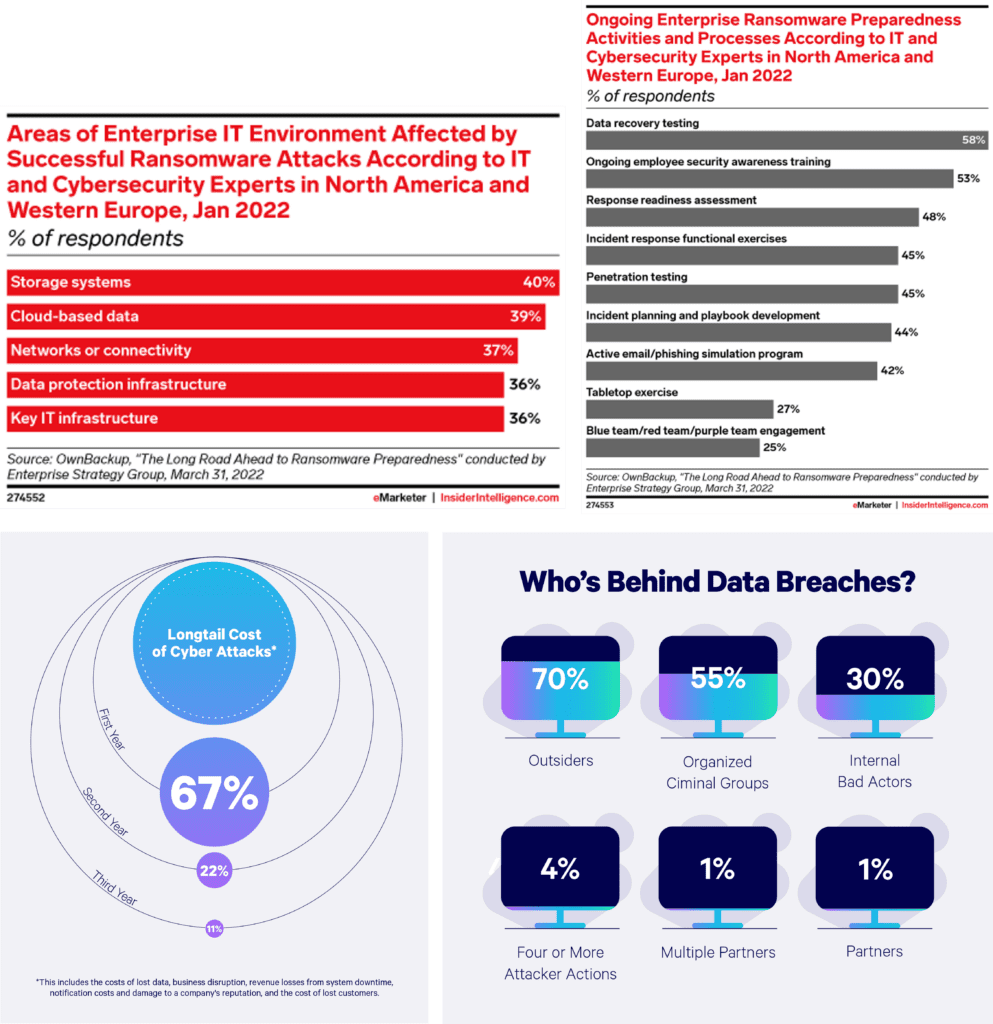Cybercrime will cost companies worldwide an estimated $10.5 trillion annually by 2025, up from $3 trillion in 2015. At a growth rate of 15 percent year over year — Cybersecurity Ventures also reports that cybercrime represents the greatest transfer of economic wealth in history. The banking, financial services, and insurance (BFSI) sector are one of the most targeted sectors for cybercriminals. This sector holds a vast amount of sensitive customer data, which makes it a prime target for malicious activity. Due to the interconnected nature of the banking sector, attacks on any of the five most active US banks affect 38% of the network. It is essential that banks and financial institutions invest in building cyber resilience as cyber security threats to the financial services industry intensify. Deloitte and the Financial Services Information Sharing and Analysis Center estimated that companies running financial services, such as banks, insurance companies, and investment managers, spend between 6% to 14% of their IT budget on cybersecurity. For instance, Bank of America CEO Brian Moynihan said the company has ramped up its cybersecurity spending to over $1 billion a year.
In order to protect customer data from being compromised and prevent cyber attacks, an effective and secure data management process must be put in place.
Essential Cyber Attack Statistics and Trends to be Aware of
- According to VMware’s report, “Modern Bank Heists 5.0,” seven out of ten financial institutions do not spend more than 12% of their total IT budget on security. However, most financial institutions expect to increase their budget by 20% to 30% this year.
- According to IBM’s most recent cyber-attack report, the financial industry is already spending the most of any industry fighting off attacks, with an average cost of $5.72 million per data breach.
- Destructive attacks are launched to destroy data and dismantle subnets. Cybercriminals typically use these attacks as an escalation to destroy evidence as part of a counter-incident response. According to the VMware report, 63% of financial institutions experienced an increase in destructive attacks, a 17% increase from the previous year.
- According to the Banking Journal, companies in the financial industry reported 703 cyber attack attempts per week in Q4 2021, a 53% increase over the same period the previous year. According to some studies, one cyber attack occurs every 10 seconds on a global scale.
- In addition, 74% of respondents were victims of one or more ransomware attacks, with 63% paying the ransom.

How Efficient Data Management Can Help Prevent Cyber Attacks
Data is the lifeblood of the BFSI industry, but it’s also the top target for cyber attackers! That’s why robust data management practices are crucial for ensuring top-notch security and integrity. By collecting, storing, and sharing data securely and following essential regulations like GDPR and HIPAA, BFSI companies can keep their sensitive information safe from prying eyes. With encryption, access controls, and backup systems in place, bankers can breathe easy knowing your data is well-protected. But that’s not all – cutting-edge data management solutions that use advanced technologies like AI and machine learning can help identify potential threats before they become real problems. Detecting patterns of fraud, analyzing security gaps, and responding quickly to incidents all reduce the risk of cybercrime. Overall, bankers and financial service providers need to pay attention to the tiniest details of their data and protect it against vulnerabilities with robust data management practices.
The Benefits of Having an Efficient Data Management System
Data Classification: Data classification helps organizations to determine the appropriate level of security required to protect the data and to make informed decisions about data retention, access, and sharing. In the BFSI sector, data classification is critical as the industry handles sensitive information such as customers’ personal and financial information, trade secrets, and intellectual property. By implementing data classification, financial organizations can ensure that their most critical data is protected and that their data management systems are in line with industry regulations such as the Payment Card Industry Data Security Standard (PCI DSS) and the General Data Protection Regulation (GDPR).
Data Encryption: Data encryption is a technique that makes data unreadable and unusable without a decryption key. Encryption helps prevent unauthorized access to sensitive data, an essential component of efficient data management in the BFSI sector. Encryption can be applied to data at rest (stored data) or data in transit (data being transferred from one location to another). For example, financial organizations can use encryption to protect data stored on laptops, servers, and cloud systems and transmitted over the internet or between systems.
Data Access Control: Data access control is the process of controlling who can access data and what they can do with it. This involves assigning roles and responsibilities to individuals and systems and establishing policies and procedures for accessing and managing data. In the BFSI sector, it is critical to implement data access control to ensure that sensitive data is only accessible by authorized personnel. Access controls can include user authentication, role-based access, and multi-factor authentication.
Data Backup and Recovery: Data backup and recovery is the process of making a copy of critical data and storing it in a secure location to ensure that it can be recovered in the event of data loss. This is an essential component of efficient data management in the BFSI sector as the financial industry handles large amounts of critical data that must be protected. Data backup and recovery can be implemented through the use of cloud-based storage systems, off-site storage facilities, or through the use of backup tapes or disk arrays.
Data Governance: Data governance is the process of managing data as a valuable asset and ensuring that it is used in a manner that supports the goals and objectives of the organization. In the BFSI sector, data governance is critical as the industry handles sensitive information that must be protected and regulated. Data governance involves establishing policies, procedures, and processes for data management, as well as ensuring that these policies are followed by all employees.
Organizations in the BFSI sector need to manage a variety of data, including customer information, financial records, and confidential business information. This data is often stored in different systems and locations, making it difficult to track and protect. Additionally, 80% of it is unstructured and dark. Organizing and categorizing unstructured data in the banking and financial services industry presents a huge opportunity with three principal applications: fighting cyber threats, improving the consumer experience, and adhering to compliance.
The Data Dynamics unified data management platform is an effective solution that can assist financial organizations in maximizing the value of their unstructured and high-volume data while ensuring that robust security measures are in place to prevent data breaches. The platform achieves this by centralizing data, identifying personally identifiable information (PII), and improving security controls like data remediation, data quarantining, access control management, and immutable audit logging. This helps organizations to manage their financial data efficiently while maintaining the integrity of their data. Overall, the Data Dynamics unified data management platform is an excellent solution for financial organizations that want to improve their data management practices, prevent data breaches, and ensure that their sensitive data is well-protected.
To know more about Data Dynamics’ Security suite, please visit – https://www.datadynamicsinc.com/security/ or contact us at solutions@datdyn.com I (713)-491-4298.






